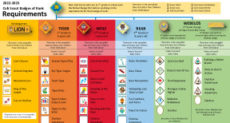Happy New Year! Thank you for your efforts to bring Scouting to youth throughout the last year despite the challenges we faced. Here’s hoping that the new year brings success and prosperity for your unit and a rewarding experience for you as a volunteer.
Temporary accommodations
At the outset of the pandemic, the Advancement Team approved several temporary changes to a few of the requirements that allowed them to be met despite the isolation and social distancing that we faced. Effective March 1, 2022, these changes will sunset and requirements will revert to those as written. These include:
- Advancement modifications to rank and merit badge requirements
- Aquatics requirement modifications, including swimming requirements for Second Class, First Class, and Sea Scout ranks, as well as swim test requirements
- Suspension of requirement 9b (“On any three camping experiences, do two of the following”) for the Camping merit badge
In addition, all requests for an extension of time to complete Eagle Scout requirements are now submitted to the local council rather than the national council. These extensions are available only to youth who meet the three tests in Section 9 of the Guide to Advancement (a lack of sufficient time to complete time-based requirements, a significant circumstance beyond the Scout’s control, and that the circumstance could not be foreseen).
These updates, and a summary of all current changes and modifications, are found in the BSA’s Covid-19 FAQ, which is updated as circumstances change.
Check your Youth Protection Training status
Now that most units have completed rechartering, those with expired or expiring Youth Protection Training should have re-taken the course and will be good for two more years. There may be many, however, whose training will expire in the next two or three months and were allowed to re-charter. It’s wise to know when your own YPT expires, so you can make plans to re-take the course. This post from Scouting Magazine walks you through the process. Unit Key 3 volunteers (Cubmaster/Scoutmaster, Committee Chair and Chartered Organization Representative) can run a report on the entire unit in MyScouting and remind those whose training expires soon to re-up.
Why do you volunteer?
Like most of us, at your first meeting as a den leader, you felt overwhelmed and unsure of yourself and why you agreed to do this. If you ever saw the old Cub Scout Leader Basic Training videos, you’ll remember the den leader, surrounded by energetic seven-year-olds, throwing her hands in the air and saying “What have I gotten myself into?” Soon, you discovered the value of helping youth discover themselves and the world around them and set them on the path to becoming solid citizens.
The typical adult volunteer is involved in their unit for about the same time that their children are active, but many continue their involvement in Scouting much longer. My younger son aged out eight years ago, so I continued on as a unit commissioner, helping others in their volunteer adventure. I’ll be completing twenty-two years as a volunteer later this year, but I’ve known many who have racked up many more years. Here’s an inspiring story about a Scoutmaster who has served his troop for an incredible sixty-eight years. It’s worth reading to find what inspires him and see the impact he’s had on the Scouts he has served.
That’s all for this month. Be sure to get in touch if there’s anything I can help with, or if you have any ideas for topics in future articles. Stay well, stay inspired, and always Do Your Best!
This post first appeared on Bobwhite Blather.



